
Guests
- Mohsen Mahdawiformerly detained Columbia University student and Palestinian activist.
In his first live interview since his release from ICE detention, Columbia University student and Palestinian activist Mohsen Mahdawi recounts the traumatic experience of his arrest and incarceration. Mahdawi, a green card holder who was born and raised in a refugee camp in the occupied West Bank, was arrested in Vermont on April 14 when he appeared for what he was told would be a citizenship interview, and spent more than two weeks in U.S. immigration custody, where he was held in retaliation for his speech in support of Palestinian rights. Mahdawi’s detention has led him to reflect on the “interconnectedness between injustices,” as multiple members of his family in Palestine have been “unjustly” incarcerated in Israeli jails. “Now I can feel their pain,” says Mahdawi. Despite the U.S. government and pro-Israel groups’ attempts to silence his calls for an end to genocide in Gaza, he adds, “I share my pain with the world.”
Transcript
AMY GOODMAN: This is Democracy Now!, democracynow.org, The War and Peace Report. I’m Amy Goodman.
Today, a Democracy Now! global exclusive. We’re joined by Mohsen Mahdawi in his first live interview since being released after spending more than two weeks in a Vermont prison. Mahdawi is a Columbia University student, Palestinian activist, who holds a green card. He’s a legal permanent resident. He was arrested in Vermont in mid-April when he appeared for what he had been told was his naturalization interview. After completing the interview, he ended up being taken away by armed and masked federal agents.
Mohsen moved to Vermont from the occupied West Bank in 2014, where he was third generation in his family to live in al-Faraa, a Palestinian refugee camp. He later attended Lehigh University in Pennsylvania, before transferring to Columbia in 2021 to study international affairs. At Columbia, he was co-president of Columbia’s Palestinian Students Union and served as president of Columbia University’s Buddhist Association for two years.
Mohsen Mahdawi is one of several students who have been detained by the Trump administration. Former Columbia student protest leader Mahmoud Khalil has been detained since March 8th. Tufts Ph.D. Fulbright scholar Rümeysa Öztürk was released a week ago after six weeks in detention. And Georgetown University scholar Badar Khan Suri was freed on Wednesday after nearly two months in detention.
Mohsen Mahdawi spent two weeks in a Vermont prison before a federal judge in Vermont ordered him released on bail. The judge, Geoffrey Crawford, compared the recent detentions of immigrant student protesters to the Red Scare and the Palmer Raids of 1919-’20. This is Mohsen Mahdawi speaking to supporters just after his release, April 30th.
MOHSEN MAHDWAI: And I am saying it clear and loud to President Trump and his Cabinet: I am not afraid of you.
AMY GOODMAN: Judge Crawford ruled Mahdawi should stay in Vermont but could come to New York for educational purposes. When the government objected, the judge responded, Mohsen Mahdawi could travel to New York to attend his graduation at Columbia. The judge went on to write, quote, “During his time in New York State, Mr. Mahdawi is permitted to move freely and conduct his daily activities normally including, but not limited to, meeting with elected officials, speaking with and being interviewed by members of the press and media, speaking at public events, attending protests,” the judge wrote. Mohsen Mahdawi hopes to begin graduate studies in September at Columbia’s SIPA — that’s the School of International and Public Affairs. But the Trump administration is still trying to deport him.
Well, Mohsen Mahdawi joins me here now in our New York studio for his first live interview.
Welcome to Democracy Now! Congratulations on your freedom, Mohsen.
MOHSEN MAHDAWI: Thank you, Amy. It’s a pleasure to be with you. And good morning to your audience, as well.
AMY GOODMAN: So, if you can start off by telling us what happened, why you ended going — ended up going back to Vermont for this final, what you thought, immigration interview? What happened?
MOHSEN MAHDAWI: I mean, I was waiting for this interview, which is my naturalization process to receive a citizenship, for over a year. And the reason I had to go to Vermont, because my residence, my permanent residence, is in Vermont. Therefore, I went to, basically, what I thought should be a normal, you know, naturalization interview. I expected at the same time that there might be a trap set up for me, just seeing and witnessing what happened to other students, including Mahmoud Khalil and Rümeysa Öztürk, and therefore, I was prepared for that interview that I might come on the other side with full rights or no rights.
AMY GOODMAN: We interviewed Vermont Congressmember Becca Balint at the time, because you had written to her — she’s the sole congressmember in Vermont — as well as to Senators Peter Welch, who visited you in prison, and Senator Bernie Sanders. You wrote them all, because you were so concerned about what would happen?
MOHSEN MAHDAWI: This is exactly right. I mean, I prepared for many different — on many different levels. Part of why I stayed in Vermont is because of the support that I received from official representatives, such as the senators and the congresswoman, who I’m very grateful for. But at the same time also, I had to arrange with my lawyers in order to have everything drafted, ready to go, just prepared for the worst-case scenario. So I prepared with the lawyers, contacted my representatives and contacted my community members, who are very close to me. And we saw the aftermath of this is I was able to stay in Vermont, something that other students did not have the luxury to do. They were uprooted from their communities and from legal support.
AMY GOODMAN: So, what happened? You go to the naturalization interview. What day was that?
MOHSEN MAHDAWI: It was on the 14th of April.
AMY GOODMAN: And you went with your lawyer?
MOHSEN MAHDAWI: I went with one of my lawyers, an immigration lawyer. We go into USCIS office. This is the immigration office where I’m supposed to have my interview. And everything looked kind of normal. There were some signs. The officer who interviewed me inside was waiting for us. And after being in the lobby for a few minutes, the lobby was emptied from any other applicants, so it was only myself, my lawyer and my friend. And I looked at them, and I said, “This is the calm before the storm.”
AMY GOODMAN: And so, you had your interview. Did you sign any documents?
MOHSEN MAHDAWI: Yes, I went through my regular interview for citizenship, to the point I thought that I am going to receive the citizenship that same day, because I was asked the questions that I had to answer, I answered the questions correctly, and then I was asked if I am willing to take the Pledge of Allegiance. When the officer asked me if I am willing to do so, I said, “Of course.” And he asked me to sign a document saying that I am willing to actually protect and defend the Constitution of this country. And shortly after that moment, just within a minute, the DHS agents storm the office, separate me from my lawyer, and they say that I am under arrest.
AMY GOODMAN: Masked?
MOHSEN MAHDAWI: I mean —
AMY GOODMAN: Were they masked?
MOHSEN MAHDAWI: They were masked. They had hoods on. You could not recognize them. And they had guns on them, as well.
AMY GOODMAN: And they massed around you? Did they handcuff you?
MOHSEN MAHDAWI: Yes, directly, actually. There was not any space or room to show us documents or to explain anything. And they said, “You’re under arrest.” So I gave them my hands, and I said, “I am a peaceful man. I am not going to resist.”
AMY GOODMAN: And so, you were taken. Where was your lawyer?
MOHSEN MAHDAWI: They prevented my lawyer from being with me. So, I was taken through the back door into the lobby, outside of that building, into an unmarked SUV, and my lawyer did not know what’s happening with me. In fact, at that time, all of what was going in their head is to basically execute the premeditated plan that they had in mind, which is to ship me, to send me to Louisiana. They had the tickets, the airplane tickets, printed and ready.
AMY GOODMAN: The agents?
MOHSEN MAHDAWI: The agents had the tickets ready.
AMY GOODMAN: So, they drove you to Burlington?
MOHSEN MAHDAWI: Well —
AMY GOODMAN: The airport?
MOHSEN MAHDAWI: Yes. Before they took me to the airport, they took me to a building to process me. And the processing, which we expected to take place at the — in St. Albans at the prison, did not actually take place there. So I was surprised, very surprised. They processed me in a different building, separate building, only 10 minutes away from the airport. And then they drive me to the airport, and they hand me to two other agents who are supposed to fly me on a commercial flight.
AMY GOODMAN: And what happened?
MOHSEN MAHDAWI: At that moment, I asked the agents, I said, “Are we going to Louisiana?” And they said, “Yes.” And I asked, “Which direction?” So, I clarified that it’s going to stop by New York City, then to Louisiana. We went into the airport, and we realized that the flight was — basically, we were late. The flight was about to take off. The airplane was being taxied. During that time, I also was not feeling well, so I had to use the restroom for a brief time. And the moment I get out of the restroom, while we’re walking towards the gate, we see the airplane being taxied away.
AMY GOODMAN: So, your stop in the bathroom saved you from this plane.
MOHSEN MAHDAWI: I don’t know if that is the reason, but some people think that this might be the reason.
AMY GOODMAN: When you got to the airport, you saw the plane pulling — when you got to the gate, you saw the plane pulling away?
MOHSEN MAHDAWI: Yes,
AMY GOODMAN: And what did that allow time for, for your lawyer?
MOHSEN MAHDAWI: I mean, if you think of it, that has changed the path of my legal — my legal fight for justice. It allowed my lawyers to fight on fair ground and to free me within 16 days, something that other students, as you saw, weeks and months they’ve been in detention.
AMY GOODMAN: So, you were held in detention in a prison in Vermont.
MOHSEN MAHDAWI: Correct.
AMY GOODMAN: With other migrants?
MOHSEN MAHDAWI: That’s right. In this prison, in fact, basically, ICE rents a section of the prison. And the section where I was, it was a mixture of three-quarters of people who have committed crimes before, and one-quarter of migrants who come in and out. And I was — my cell was C-38, the first cell in that C section where the migrants are. So, I saw waves of the migrants. Those are not just migrants. Those are the people who feed us, who plant our food, who harvest our organic, delicious Vermont produce.
AMY GOODMAN: Like the dairy workers who were detained.
MOHSEN MAHDAWI: And the dairy workers, as well. So, I was able to meet the first wave, which is farmworkers who, you know, worked on farms. And the second wave was farmworkers who worked on the dairy, on — sorry, in dairy farms.
AMY GOODMAN: Describe the conditions of your detention and what that brought to you, what that reminded you of.
MOHSEN MAHDAWI: Fabrics of injustice, you see them everywhere. I was prepared for worst-case scenario. So, to be honest with you, being in this prison was not as bad as I thought, mentally. But the difficult part was realizing this interconnectedness between injustices. It reminded me of my uncles, and specifically my uncle Abed, at some point when a guard shined the light through the square window in the door, and the light was so strong in my eyes, and I remembered my uncle, who had bloody eyes permanently. And then I thought —
AMY GOODMAN: Where was your uncle?
MOHSEN MAHDAWI: My uncle was imprisoned in the Israeli prisons, and now he’s no longer alive.
AMY GOODMAN: He was in the West Bank?
MOHSEN MAHDAWI: He passed away two years ago. That’s correct. He was born, raised and died in a refugee camp, the same refugee camp where I was born.
AMY GOODMAN: Al-Faraa.
MOHSEN MAHDAWI: Yeah, yeah. And I had this realization when I was there: I am now interconnected to three generations of my family — my grandfather who was unjustly imprisoned, my father and my uncles who were unjustly imprisoned, and my cousins who were also unjustly imprisoned. And now I can feel their pain.
AMY GOODMAN: You also lost your brother, as well as other members of your family. Talk about where you were born. Talk about your family in the West Bank and in Gaza.
MOHSEN MAHDAWI: What I am doing here in America, this is exactly the question that I hope for the government to ask and to look into, rather than just labeling me. What I’ve been protesting for is related to my firsthand life experience. As a child, I buried my own brother when I was 8 years old. He was 6 years old. And my brother faced serious issues. He was paralyzed because the Israeli army prevented my father from taking him to receive medical care. The camp was under siege. And then, in the Second Intifada, when it started in 2000, I was 10 years old, and I witnessed my best friend getting shot and killed in front of my eyes. And the pain of injustice that you feel when you see just a kid who you loved so much be — his life being taken away in a second, is a painful experience. But that wasn’t it, too. My uncle, on September 12, 2001, after September 11, my uncle Thayer was killed on the hands of the Israeli army, as well.
AMY GOODMAN: Where?
MOHSEN MAHDAWI: In Tamoun, in fact, between Al-Faraa refugee camp and Tamoun, the same town that five people were killed. It’s only five miles away — actually, five kilometers away, about three miles away, from the refugee camp.
AMY GOODMAN: The five people who were just killed in the last day.
MOHSEN MAHDAWI: That’s correct. So it hits home, everything that I am seeing and I am witnessing. I mean, in the Second Intifada, also I lost two cousins. I was shot in my leg when I was 15 years old. And some people would say, “Oh, what was happening? And why those people were killed?” This does not — what matters is that children live in pain, in suffering, in trauma. And we have to see that for what it is. And we cannot just justify the killing, the murder, the continuous occupation, the apartheid, the genocide. We cannot justify it anymore. We either have to be pro-peace or pro-war. There is no third option. Enough is enough. So many people are suffering. And for me, many family members in the West Bank since October 7th, four cousins in Gaza, more than 30 of my extended family.
And I come here to Columbia, and what I do, I share my pain with the world, and I say, “This is so painful. The war must stop. Children are suffering. The trauma is unbearable.” And what they do, the American government and the extreme groups, the pro-Israel extreme groups, they want to silence me. They don’t want me to grieve. They don’t want me to share the pain. They don’t want me to share the loss. They don’t want me to ask for justice. Doesn’t matter if I’m doing it in the most peaceful, nonviolent way or not. They want to silence me.
AMY GOODMAN: You were president of the Columbia University Buddhist Association for two years. What made you become a Buddhist?
MOHSEN MAHDAWI: I discovered Buddhism when I came to America. And what made me become Buddhist is the practice of meditation and empathy that helped me with my pain and the trauma that I buried as a child. So, when I came to America, for the first time in my life, I was provided with a level of safety, to feel safe. And when you have that level of physical and emotional safety, the trauma starts surfacing. And Buddhism has helped me to center, to calm my emotions and to be able to connect with the other, even my oppressors, even people who cause me harm. And this is how I started my journey and dive deeper into Buddhism, until I led the Buddhist Association at Columbia.
AMY GOODMAN: Over these last few months, the protests that have taken place across the country calling for the release of the detained students, like yourself, have been massive. And on April 20th, protesters gathered at Union Square to call for your release. The protest was organized by Israelis for Peace. This is Josh Drill, an Israeli American master’s student at Columbia University.
JOSH DRILL: To deport someone like Mohsen sends a chilling message, that peace builders are not welcome here. It derails the very path we so desperately need, and it actively stops Israelis and Palestinians from meeting. As a peace collective, we cannot allow this to happen. We cannot allow these deportations to happen. They threaten our future.
AMY GOODMAN: At that protest, I also spoke to the New York City Comptroller Brad Lander, who’s running for mayor right now.
BRAD LANDER: This is somebody who grew up in a refugee camp in the West Bank, saw a friend be killed by an Israeli soldier, and yet, rather than turn to vengeance and pick up a rock or a gun, turned to Buddhism and becomes a peace activist and comes here and goes into synagogues speaking about empathy.
AMY GOODMAN: The comptroller, running for mayor, Brad Lander. Also, Zohran Mamdani, who’s running for mayor, has come out in support of you. What was that like? How did you experience that in prison?
MOHSEN MAHDAWI: It might be too cheesy to say that I have never felt as much love and support as much as I felt when I was in the cell. I was not able to see the full spectrum of support and of love and of protests, but I heard about some of the action that was taking place. And I have to say, I was deeply moved by seeing the — everybody who has mobilized and protested, but, more specifically, by the Israeli and Jewish community in New York City and in America, really, like, moving and raising their voices against my detention.
AMY GOODMAN: Also, Judge Crawford noted his court had received more than 90 statements and letters — I understand now it’s well over a hundred — from Vermont community members, academic experts and professors, many of them Jewish, vouching for your character. What did that mean to you, Mohsen?
MOHSEN MAHDAWI: It meant that I am heard, that I am being seen, that my advocacy and work for peace and for justice did not go for nothing.
AMY GOODMAN: All of this as the Trump administration went after you, saying you promoted antisemitism. What did — Secretary of State Marco Rubio claimed in a memo that The New York Times obtained that your actions could, quote, “potentially undermine the Middle East peace process.” Your response?
MOHSEN MAHDAWI: I am not sure if they actually have a peace process. If they have a peace process, let them show us what the plan is. What we are doing is we are protesting, and we are standing against war. We’re asking for America and for the rest of the world to abide by international law and human rights as a first step. This government has been violating the basic principles of human rights and the basic principles that international law was established on. They’re violating this country’s own laws, the Leahy Laws. And if they are accusing me —
AMY GOODMAN: The former senator of Vermont.
MOHSEN MAHDAWI: Exactly. And what they are doing, they’re gaslighting the American people, and they are pointing the wrong direction. My response to this is listen to the peacemakers who we have — Palestinians, Israelis, Jews, Muslims, Americans, everyone — and see the fact and the reality for what it is. What they’re trying to do, they’re trying to distract from the real issue. And the real issue is funding and supporting a genocide and dehumanizing Palestinians and seeing them as less of a value, don’t deserve equal rights as everybody else.
AMY GOODMAN: Mohsen Mahdawi, can you talk about your dreams for the future, starting with next week? Class Day is Monday. I don’t know if it was timed for the hundredth anniversary of Malcolm X’s birthday, but that is Monday, May 19th. Graduation is Wednesday. What does it mean for you to be here in New York graduating with your classmates?
MOHSEN MAHDAWI: This is a long-waited-for journey. This is the seed of hope that my uncle Thayer has planted in me when I was 11 years old and when I was in deep level of pain, after the loss and horror and the trauma that I felt. And he said to me, he said, “After the Nakba, the 1948, we lost everything but our minds and our souls.” And he said, “Education and hope is your only way and your path moving forward, because we have nothing left.” And in honor of my uncle’s spirit, I continued studying really hard, until I made it to this point, despite of all of the obstacles with the Israeli occupation.
And now what it means to me, it means that I can share this light of hope, not only with my uncle’s spirit that might be hovering above us, but also with the children who are living in painful conditions in Gaza, the children who lost their parents, who lost their friends, their family members, who have been terrorized with all of the pain and the destruction and the bombing. I tell them that there is a way moving forward, and that way is education. Education is light, education is hope, and education is the path to move forward.
AMY GOODMAN: You’re not only hoping to graduate next week, walking with your classmates, but then you want to go on to SIPA, to the Columbia School of International and Public Affairs graduate school, where you’ve been accepted. The judge in Vermont says you should be able to be here in New York to continue your educational activities.
MOHSEN MAHDAWI: Yes. This is also to fulfill the dream that I have, the dream of peacemaking, of conflict resolution. This is the whole point I came to Columbia, and this is the whole point why I am going to study at SIPA.
The American government, as it seems to me, they don’t want me to continue my education. They didn’t want me to graduate, and they don’t want me to get my master’s degree.
I also have to share that what happens at Columbia University matters for the rest of America. The Columbia University administration, as I have been witnessing it, has been participating in the deterioration and destruction of the democratic system. They are not listening to their students. The students have, like the majority of the student body have, voted to divest from war, any entities that are supporting the apartheid and the genocide. Columbia University administration is not listening. And in a matter of few days, I will be walking, and I will be walking with a conflict, mixed feelings, the feeling that I love this university that has given me tools to express my thoughts and to yearn and to achieve my dreams for freedom and for justice, and the other feelings that I feel deeply disappointed by the Columbia University administration. And I know that it’s going to continue to be a struggle while I am going to be finalizing my master’s degree.
AMY GOODMAN: As you and Rümeysa Öztürk, the Tufts University student, and Badar Khan Suri, the Georgetown scholar, are released, others remain detained, like Mahmoud Khalil, a judge in Vermont among those determining his fate. What is your message to those still behind bars and those whose names we don’t know?
MOHSEN MAHDAWI: I say the same message, that don’t give up, and don’t give up on the idea of justice. Justice is inevitable. It’s a matter of time. And don’t give in to despair. What we are seeing with my release, with Rümeysa’s release and with Dr. Khan’s release, those are light of hope. And you will be next, and we will be able to celebrate you very, very soon.
The same message that the Gazan people have been sending to us, we’re gaining strength from them, to see all of the destruction, almost no buildings left in Gaza, no schools, universities, that I’m going to graduate. No more universities for students to attend or to graduate from in Gaza, a painful reality. They are sending us a message that there is so much more to hope for than giving up on the idea of justice and surrendering to fear and to violence. So, I say, stay strong, and we will celebrate under the sun in a matter of a very short time.
MOHSEN MAHDAWI: Well, I want to thank you so much for taking this time to come to our studio in New York. Mohsen Mahdawi, Columbia University student, Palestinian activist, former president of the Columbia University Buddhist Association, was detained in a Vermont prison for two weeks. He graduates from Columbia University next week.
When we come back, we look at the Republican push for sweeping cuts to Medicaid and the Supreme Court oral arguments on Trump’s restrictions on birthright citizenship. Stay with us.
[break]
AMY GOODMAN: “El Misterio” by Radio Jarocho, performing in our Democracy Now! studio.

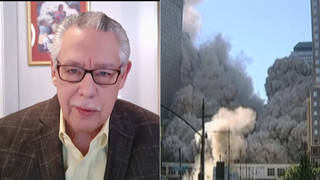

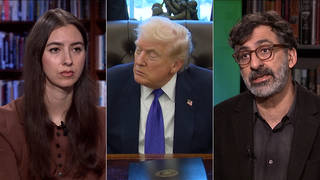
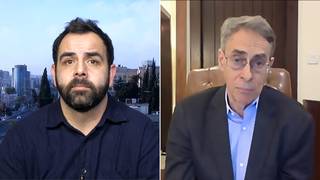





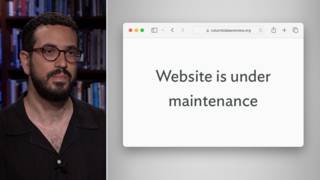

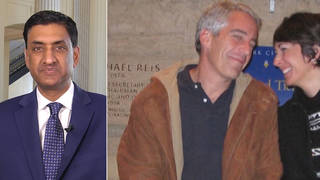
Media Options